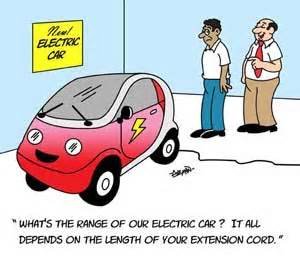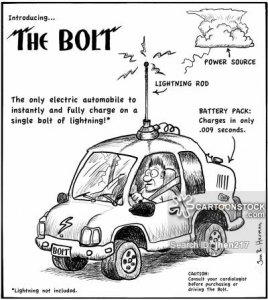Falcon
DV8
- Location
- So. California
Eric test drove the Chevy Volt at the invitation of General Motors...and he writes...For four days in a row, the fully charged battery lasted only 25 miles before the Volt switched to the reserve gasoline engine.
Eric calculated the car got 30 mpg including the 25 miles it ran on the battery. So, the range including the 9 gallon gas tank and the 16 kwh battery is approximately 270 miles.
It will take you 4 1/2 hours to drive 270 miles at 60 mph. Then add 10 hours to charge the battery and you have a total trip time of 14.5 hours. In a typical road trip your average speed (including charging time) would be 20 mph.
According to General Motors, the Volt battery holds 16 kwh of electricity. It takes a full 10 hours to charge a drained battery. The cost for the electricity to charge the Volt is never mentioned so I looked up what I pay for electricity. I pay approximately (it varies with amount used and the seasons) $1.16 per kwh. 16 kwh x $1.16 per kwh = $18.56 to charge the battery.
$18.56 per charge divided by 25 miles = $0.74 per mile to operate the Volt using the battery. Compare this to a similar size car with a gasoline engine that gets only 32 mpg. $3.19 per gallon divided by 32 mpg = $0.10 per mile.
The gasoline powered car costs about $15,000 while the Volt costs $46,000.........So the American Government wants proud and loyal Americans not to do the math, but simply pay 3 times as much for a car, that costs more than 7 times as much to run, and takes 3 times longer to drive across the country..... Where do I sign ?
Eric calculated the car got 30 mpg including the 25 miles it ran on the battery. So, the range including the 9 gallon gas tank and the 16 kwh battery is approximately 270 miles.
It will take you 4 1/2 hours to drive 270 miles at 60 mph. Then add 10 hours to charge the battery and you have a total trip time of 14.5 hours. In a typical road trip your average speed (including charging time) would be 20 mph.
According to General Motors, the Volt battery holds 16 kwh of electricity. It takes a full 10 hours to charge a drained battery. The cost for the electricity to charge the Volt is never mentioned so I looked up what I pay for electricity. I pay approximately (it varies with amount used and the seasons) $1.16 per kwh. 16 kwh x $1.16 per kwh = $18.56 to charge the battery.
$18.56 per charge divided by 25 miles = $0.74 per mile to operate the Volt using the battery. Compare this to a similar size car with a gasoline engine that gets only 32 mpg. $3.19 per gallon divided by 32 mpg = $0.10 per mile.
The gasoline powered car costs about $15,000 while the Volt costs $46,000.........So the American Government wants proud and loyal Americans not to do the math, but simply pay 3 times as much for a car, that costs more than 7 times as much to run, and takes 3 times longer to drive across the country..... Where do I sign ?




